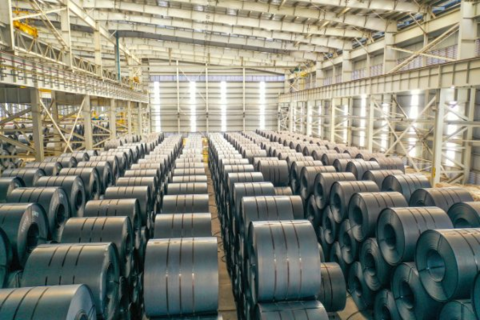
Inside a factory of Hoa Phat Group (HPG). Since the beginning of 2023, domestic construction steel prices have witnessed five-six downward adjustments, depending on different brands. — Photo courtesy of Hoa Phat Group
The freezing of the Chinese real estate market, falling prices of rebars in China, Viet Nam’s EVN raising electricity prices, and the State Bank lowering interest rates for the third time will all impact the resilience of businesses in the steel industry in the short term.
Domestic and world steel prices fell sharply
Since the beginning of 2023, domestic construction steel prices have witnessed five-six downward adjustments, depending on different brands.
After the adjustments, construction steel is at the prices of VND14.62 million to VND15 million per tonne for CB240 coil steel and about VND15 million to VND15.5 million per tonne for D10 CB300 rebar. If this trend continues, the reserve pressure will increase again on steel enterprises.
According to data from Trading Economics, after positive signs of recovery in the first quarter, the price of rebar in the Chinese market since mid-May dropped to the lowest level in nearly seven months and also close to the 2-year bottom.
Weak demand in China market
In a recent report, Viet Dragon Securities (VDSC) said that the largest steel production and consumption market in the world – China – is experiencing a period of lack of information, leading to an impact on the futures contract prices of steel materials and products.
At the end of last week, China's yuan fell to a two-month low due to inflation. This raises concerns about deflationary risks in the industrial manufacturing community.
China's real estate, construction and building materials markets are looking forward to a stronger and more effective economic stimulus measure from the government. However, the central bank has previously cut back the required reserve ratio for banks and directed banks to reduce deposit interest rates to promote credit.
Rising electricity prices - profit barrier for steel group
Information that EVN adjusted the average retail prices of electricity from the beginning of May has also put a lot of pressure on steel producers. This adjustment led to an increase of 3 per cent compared to the current average retail electricity price.
Mirae Asset Vietnam Securities said that the increase in the retail price of electricity might cause negative effects on some electricity-intensive manufacturing industries such as Cement, Chemicals, Metallurgy (Steel) and Paper.
Mirae Asset estimates that a 3 per cent increase in electricity costs could reduce the total profit before tax of the Steel industry by 15 per cent.
'Bright spot' for profit picture
Recently, the State Bank has changed the maximum interest rates for deposits in Vietnamese dong with a term of one-six months from 5.5 per cent per year to 5 per cent per year, which will be applied from May 25, 2023.
Assessing the impact of interest rate cuts, Mirae Asset (MASVN) said it could benefit industries with large total debt.
Mirae Asset assumes that the reduction in deposit interest rates will lead to a decrease in the Bank's short-term lending rates to 5 per cent per year.
Based on this assumption, MASVN estimates that a decrease in lending rates will positively affect pre-tax profit growth in some sectors with high debt ratios. VNS